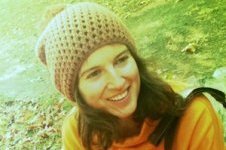Search
To search for an exact match, type the word or phrase you want in quotation marks.
A*DESK has been offering since 2002 contents about criticism and contemporary art. A*DESK has become consolidated thanks to all those who have believed in the project, all those who have followed us, debating, participating and collaborating. Many people have collaborated with A*DESK, and continue to do so. Their efforts, knowledge and belief in the project are what make it grow internationally. At A*DESK we have also generated work for over one hundred professionals in culture, from small collaborations with reviews and classes, to more prolonged and intense collaborations.
At A*DESK we believe in the need for free and universal access to culture and knowledge. We want to carry on being independent, remaining open to more ideas and opinions. If you believe in A*DESK, we need your backing to be able to continue. You can now participate in the project by supporting it. You can choose how much you want to contribute to the project.
You can decide how much you want to bring to the project.
“An I-phone for each of us, a house for my mum, a surprise holiday to Jamaica, a giant water slide, a feast in the local McDonald’s…” It’s early September in the East Side Youth Club in Bow, East London. A group of kids between eight and twelve years need to collectively – and hopefully, democratically – decide how to spend the juicy sum of £7,000. Their benefactor is artist Pilvi Takala, recipient of this year’s Emdash Award to realize, through a three-month residency at Gasworks, a new commission for Frieze Projects. Wanting to create something that could extend beyond the art fair, Takala left the prize money in the hands of this committee, and determinedly campaigned to create a space of limitless possibilities: free of adult paternalism, moralism and categorical systems of reward.
In the field of pedagogy there is an ongoing debate between traditional versus alternative education, which can be plainly depicted as follows: the former is curriculum-centered and understands the child as an immature being who, through dogmatic nurturing, will become qualified for a remote future. The latter is participatory, and conceives the child as a fully engaged being who, by an experiential process of learning and unlearning, develop their full potential as a social agent. For the former the child goes from green to ripe. For the later the child is already able; as progressive educator John Dewey would put it: “education is a process of living, not a preparation for future living.”
Typically, childhood is seen as an intermediate state, a shared limbo where children rehearse their destinies and dream of prosperous careers. Through history, different pedagogical movements have challenged this passive and perhaps naive status, each of them implying a precise political agenda for their juniors. Paulo Freire’s Critical Pedagogy guided students to develop a consciousness of freedom and to connect knowledge and power. John Dewey’s progressive education campaigned for democratic and interactive methodologies in order to achieve social progress and reform. Meanwhile, anarchist Francesc Ferrer’s Escuela Moderna already offered a revolutionary space: a non-hierarchical, anti-dogmatic, counter-cultural programme which promoted skill-sharing and collectivism within its communities. Beyond their dissimilarities, these movements share a core set of principles: children are not passive objects, but subjects with an active role within society; learning must be present, integral and experiential, not an amateur rehearsal for future living; and the school is a form of community, therefore students are already partaking in society.
It’s now the 18th of October at Frieze Projects and the group is sitting around a big table, which somehow recreates their familiar community center. The committee final’s verdict is bold and memorable “a five-star bouncy house.” Adults’ anxieties are instantly relieved: the kids didn’t fail, didn’t split with the money and run away, didn’t hurt themselves or devour tones of sweets. They worked together to create something that represents them – arguably an art project – and it is colorful, playful and dynamic. It has “a toilet that breaks wind when you jump on it and a wall made of Velcro, so that people wearing Velcro suits can latch onto it”. It will also be launched in east London’s Victoria Park, so other local kids can join the festivities. But over and above, Bouncy House is a social enterprise: it can be rented out for private events to raise funds for their East Side Youth Club and for cancer research charities. In adding this dimension, they seem fully aware of the ongoing cuts in social welfare, the economic struggles to fight illness, and the current pressure on community centers to become entrepreneurial. Their response is a unique product, with its branding and marketing strategy, that can generate both entertainment and income for their communities. It demonstrates their knowledge and ability to take constructive action for social change. After all, they could have just gone to Legoland.
Emdash Award 2013: Joe’s view on buying from Frieze London on Vimeo.

Bárbara Rodríguez Muñoz is a writer and curator interested in urgent social issues, related psychical and psychological constrains on individuals and collectives, and the liberating potential of self-expression. She is currently researching into the complexity and prevalence of anxiety in modern life for a London-wide interdisciplinary Arts Festival: anxiety2014.org
"A desk is a dangerous place from which to watch the world" (John Le Carré)